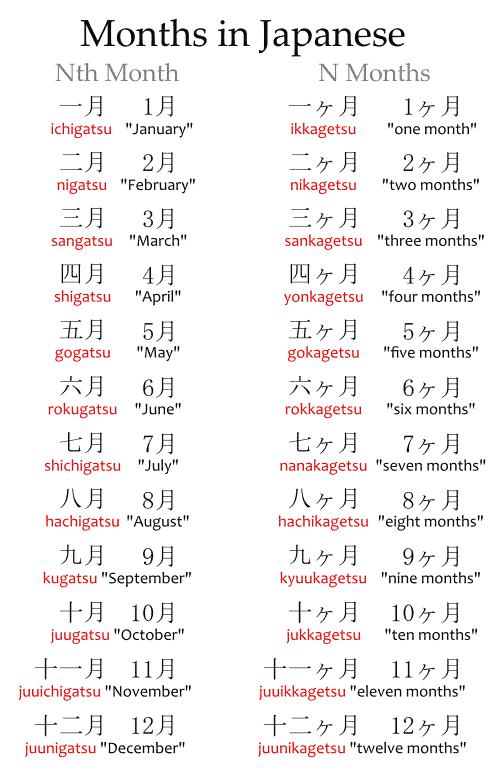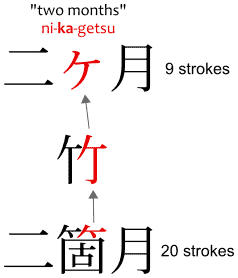In Japanese, months don't have names like January, February, etc., the way we have in English. Instead, February, the second month, for example, is referred to as "month two," ni-gatsu 二月. Its number may also be spelled with an Arabic numeral instead of kanji, as 2月.
| Month Name | In Japanese | romaji | Translation |
|---|---|---|---|
| January | 一月 or 1月 | ichigatsu | Month one. |
| February | 二月 or 2月 | nigatsu | Month two. |
| March | 三月 or 3月 | sangatsu | Month three. |
| April | 四月 or 4月 | shigatsu | Month four. |
| May | 五月 or 5月 | gogatsu | Month five. |
| June | 六月 or 6月 | rokugatsu | Month six. |
| July | 七月 or 7月 | shichigatsu | Month seven. |
| August | 八月 or 8月 | hachigatu | Month eight. |
| September | 九月 or 9月 | kugatsu | Month nine. |
| October | 十月 or 10月 | juugatsu | Month ten. |
| November | 十一月 or 11月 | juuichigatsu | Month eleven. |
| December | 十二月 or 12月 | juunigatsu | Month twelve. |
Likewise, the name of the anime 3-Gatsu no Lion 3月のライオン means literally "The Lion of March."
Counting Months
The words ichigatsu, nigatsu, etc., are only used to refer to a month on the calendar, such as "month number two." In order to say "two months," as in a length of time—e.g. "it takes two months to do this"—we use ~kagetsu ~ヶ月 instead, which is a counter for months.
| Time length | In Japanese | romaji |
|---|---|---|
| One month | 一ヶ月 or 1ヶ月 |
ikkagetsu |
| Two months | 二ヶ月 or 2ヶ月 |
nikagetsu |
| Three months | 三ヶ月 or 3ヶ月 |
sankagetsu |
| Four months | 四ヶ月 or 4ヶ月 |
yonkagetsu |
| Five months | 五ヶ月 or 5ヶ月 |
gokagetsu |
| Six months | 六ヶ月 or 6ヶ月 |
rokkagetsu |
| Seven months | 七ヶ月 or 7ヶ月 |
nanakagetsu |
| Eight months | 八ヶ月 or 8ヶ月 |
hachikagetsu |
| Nine months | 九ヶ月 or 9ヶ月 |
kyuugatsu |
| Ten months | 十ヶ月 or 10ヶ月 |
jukkagetsu |
| Eleven months | 十一ヶ月 or 11ヶ月 |
juuikkagetsu |
| Twelve months | 十二ヶ月 or 12ヶ月 |
juunikagetsu |
This counter is mixed with others like this:
- ikkagetsu isshuukan
一ヶ月一週間
One month and one week long. - ichinen ikkagetsu
一年一ヶ月
One year and one month long.
Referring to halves:
- hankagetsu
半ヶ月
Half month. - ikkagetsu-han
一ヶ月半
One month and half.
Since it's a counter, it can be used with the mo も particle to say stuff like this:
- ikkagetsu mo kakarimasen yo
一ヶ月もかかりませんよ
It won't take even one month. (it will be really quick.) - ikkagetsu mo kakarimashita yo
一ヶ月もかかりましたよ
It took even one month. (a whole month just for this, it was really slow.)
There's a few things to take note of.
First off, notice that the 月 kanji is read as gatsu がつ when saying "January," but getsu げつ when saying "one month." These are two different readings of the same kanji. When saying calendar months, it's gatsu, when counting lengths of time, it's getsu.
Some numbers also have multiple readings: four (四) can be shi し or yon よん, seven (七) can be shichi しち or nana なな, and nine (九) can be ku く or kyuu きゅう.
Since shi and shichi sound similar, sometimes yongatsu よんがつ and nanagatsu なながつ are used instead to disambiguate.
In a few words, there's a change of pronunciation at morpheme boundary that merges the number with the counter morpheme: ichi-ka-getsu いちかげつ becomes ikkagetsu いっかげつ, and so on.
This change is called sokuonbin 促音便, which adds a sokuon, a geminate consonant, represented by the small tsu っ.
Some words that feature sokuonbin always feature it, e.g. you don't say roku-ka-getsu ろくかげつ, you always say rokkagetsu ろっかげつ. Others can be pronounced either way, like hachikagetsu はちかげつ and hakkagetsu はっかげつ.
A weird one is jukkagetsu じゅっかげつ, the one for "ten months," because normally a juu syllable doesn't result in sokuonbin. However, a similar thing occurs in "ten minutes" being pronounced juppun 十分.
The small ke ヶ between the number and the 月 kanji is an abbreviated way to write ka 箇. It comes from the take 竹, "bamboo," component at the top of that kanji that looks like a ke ケ.
It's possible to spell all the words for counting months with this kanji instead of the small ke ヶ, e.g.: ikkagetsu 一箇月, nikagetsu 二箇月, etc.: 三箇月, 四箇月, 五箇月, 六箇月, 七箇月, 八箇月, 九箇月, 十箇月, 十一箇月, 十二箇月.
Counting Moons
The kanji for "month," getsu 月, is also the kanji for "moon," tsuki 月. Moons and months are kind of related, as it takes around one month for a moon to cycle from new moon, to full moon, to back to new moon.
These are different words spelled with the same kanji. The tsuki reading is kun'yomi 訓読み, while getsu is on'yomi 音読み.
It's possible to count moons, which in effect means you're counting months, but in this case you'll use the kun'yomi readings of the numbers, like in hitotsu 一つ, futatsu 二つ, mittsu 三つ, as opposed to the on'yomi ichi, ni, san.
- hitotsuki
一月
One moon = one month. - futatsuki
二月
Two moons = two months. - mitsuki
三月
Three moons = three months.
Confusingly, hitotsuki 一月, "one moon," is spelled the same way as ichigatsu 一月, "January," but the former is a length of time of one month, while the latter is the month in the calendar.
Generally the word will be ichigatsu, not hitotsuki. When it's hitotsuki, it will probably have furigana to disambiguate, e.g. ichigatsu will be written simply as 一月, while hitotsuki will be written 一月.
Also be warned that some words related to moon use the getsu reading and have nothing to do with months, e.g. shingetsu 新月, "new moon."
See Moon Phases in Japanese for details.
Asking Questions
To ask "what month" or "how many months" in Japanese, you use the interrogative nan~ 何~ morpheme instead of a number with the words we've seen before. For example:
- nangatsu?
何月?
What month?- This expects an answer like ichigatsu 一月, "month one," "January."
- nankagetsu?
何ヶ月?
How many months?- This expects an answer like ikkagetsu 一ヶ月, "one month."
Note that in the answers a number like ichi 一 will replace the interrogative nan~ 何~, as it's the focus of the sentence.
- anata wa nangatsu ni umareta?
あなたは何月に生まれた?
In what month were [you] born?- umu 生む - "to birth."
- umareru 生まれる - "to be birthed," passive form of umu. "To be born."
- watashi wa shichigatsu ni umareta
私は七月に生まれた
I was born in the month seven (July).- Note: when talking about months in gestation, the counter is ~kagetsu instead, since you're talking about how many months were you in gestation, and not the month in the calendar.
- watashi wa nanakagetsu de umareta
私は7ヶ月で生まれた
I was born in seven months. - The de で particle is used here because "in" means "it took" seven months for it to happen.
- sore wa {nankagetsu φ kakaru}?
それは何ヶ月かかる?
That {will take how many months}?
How many months will that take?
- kakaru - "to take" a resource, like time or money. To cost.
- sankagetsu
三ヶ月
Three months. - sankagetsu φ kakaru
三ヶ月かかる
[It] will take three months.


Genki shows the pattern as 1,6,8,10 ろっかげつ not ろくかげつ。 tae kim shows the pattern as 1,6,10. Might want to double check.
ReplyDeleteThanks. You're right, I had made a mistake.
DeleteJapanese dates and months system are pretty logical, which makes me as a learner happy ) Though they had some interesting names for months long before, like "mutsuki" - month of harmony, or "hazuki" - month of laves. Poetic...
ReplyDeleteAnd they had japanese numerals over 10 too. Like, 千まり二十まり四 (1024 - chimarihatamari yottsu). But seems like they were too lazy to pronounce 'mari' everytime, so they prefered chinese instead.